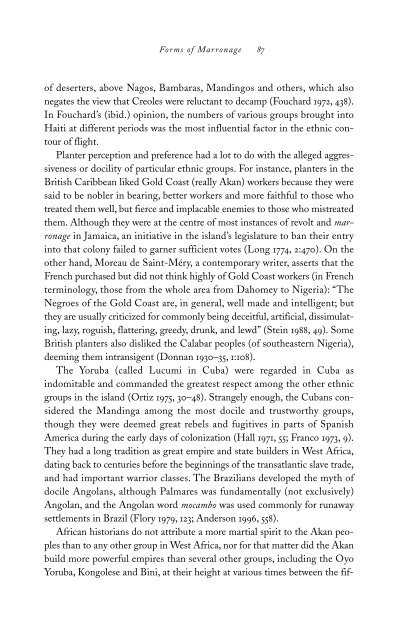60199616-flight-to-freedom-african-runaways-and-maroons-in-the-americas
60199616-flight-to-freedom-african-runaways-and-maroons-in-the-americas
60199616-flight-to-freedom-african-runaways-and-maroons-in-the-americas
Create successful ePaper yourself
Turn your PDF publications into a flip-book with our unique Google optimized e-Paper software.
Forms of Marronage<br />
87<br />
of deserters, above Nagos, Bambaras, M<strong>and</strong><strong>in</strong>gos <strong>and</strong> o<strong>the</strong>rs, which also<br />
negates <strong>the</strong> view that Creoles were reluctant <strong>to</strong> decamp (Fouchard 1972, 438).<br />
In Fouchard’s (ibid.) op<strong>in</strong>ion, <strong>the</strong> numbers of various groups brought <strong>in</strong><strong>to</strong><br />
Haiti at different periods was <strong>the</strong> most <strong>in</strong>fluential fac<strong>to</strong>r <strong>in</strong> <strong>the</strong> ethnic con<strong>to</strong>ur<br />
of <strong>flight</strong>.<br />
Planter perception <strong>and</strong> preference had a lot <strong>to</strong> do with <strong>the</strong> alleged aggressiveness<br />
or docility of particular ethnic groups. For <strong>in</strong>stance, planters <strong>in</strong> <strong>the</strong><br />
British Caribbean liked Gold Coast (really Akan) workers because <strong>the</strong>y were<br />
said <strong>to</strong> be nobler <strong>in</strong> bear<strong>in</strong>g, better workers <strong>and</strong> more faithful <strong>to</strong> those who<br />
treated <strong>the</strong>m well, but fierce <strong>and</strong> implacable enemies <strong>to</strong> those who mistreated<br />
<strong>the</strong>m. Although <strong>the</strong>y were at <strong>the</strong> centre of most <strong>in</strong>stances of revolt <strong>and</strong> marronage<br />
<strong>in</strong> Jamaica, an <strong>in</strong>itiative <strong>in</strong> <strong>the</strong> isl<strong>and</strong>’s legislature <strong>to</strong> ban <strong>the</strong>ir entry<br />
<strong>in</strong><strong>to</strong> that colony failed <strong>to</strong> garner sufficient votes (Long 1774, 2:470). On <strong>the</strong><br />
o<strong>the</strong>r h<strong>and</strong>, Moreau de Sa<strong>in</strong>t-Méry, a contemporary writer, asserts that <strong>the</strong><br />
French purchased but did not th<strong>in</strong>k highly of Gold Coast workers (<strong>in</strong> French<br />
term<strong>in</strong>ology, those from <strong>the</strong> whole area from Dahomey <strong>to</strong> Nigeria): “The<br />
Negroes of <strong>the</strong> Gold Coast are, <strong>in</strong> general, well made <strong>and</strong> <strong>in</strong>telligent; but<br />
<strong>the</strong>y are usually criticized for commonly be<strong>in</strong>g deceitful, artificial, dissimulat<strong>in</strong>g,<br />
lazy, roguish, flatter<strong>in</strong>g, greedy, drunk, <strong>and</strong> lewd” (Ste<strong>in</strong> 1988, 49). Some<br />
British planters also disliked <strong>the</strong> Calabar peoples (of sou<strong>the</strong>astern Nigeria),<br />
deem<strong>in</strong>g <strong>the</strong>m <strong>in</strong>transigent (Donnan 1930–35, 1:108).<br />
The Yoruba (called Lucumi <strong>in</strong> Cuba) were regarded <strong>in</strong> Cuba as<br />
<strong>in</strong>domitable <strong>and</strong> comm<strong>and</strong>ed <strong>the</strong> greatest respect among <strong>the</strong> o<strong>the</strong>r ethnic<br />
groups <strong>in</strong> <strong>the</strong> isl<strong>and</strong> (Ortiz 1975, 30–48). Strangely enough, <strong>the</strong> Cubans considered<br />
<strong>the</strong> M<strong>and</strong><strong>in</strong>ga among <strong>the</strong> most docile <strong>and</strong> trustworthy groups,<br />
though <strong>the</strong>y were deemed great rebels <strong>and</strong> fugitives <strong>in</strong> parts of Spanish<br />
America dur<strong>in</strong>g <strong>the</strong> early days of colonization (Hall 1971, 55; Franco 1973, 9).<br />
They had a long tradition as great empire <strong>and</strong> state builders <strong>in</strong> West Africa,<br />
dat<strong>in</strong>g back <strong>to</strong> centuries before <strong>the</strong> beg<strong>in</strong>n<strong>in</strong>gs of <strong>the</strong> transatlantic slave trade,<br />
<strong>and</strong> had important warrior classes. The Brazilians developed <strong>the</strong> myth of<br />
docile Angolans, although Palmares was fundamentally (not exclusively)<br />
Angolan, <strong>and</strong> <strong>the</strong> Angolan word mocambo was used commonly for runaway<br />
settlements <strong>in</strong> Brazil (Flory 1979, 123; Anderson 1996, 558).<br />
African his<strong>to</strong>rians do not attribute a more martial spirit <strong>to</strong> <strong>the</strong> Akan peoples<br />
than <strong>to</strong> any o<strong>the</strong>r group <strong>in</strong> West Africa, nor for that matter did <strong>the</strong> Akan<br />
build more powerful empires than several o<strong>the</strong>r groups, <strong>in</strong>clud<strong>in</strong>g <strong>the</strong> Oyo<br />
Yoruba, Kongolese <strong>and</strong> B<strong>in</strong>i, at <strong>the</strong>ir height at various times between <strong>the</strong> fif-


